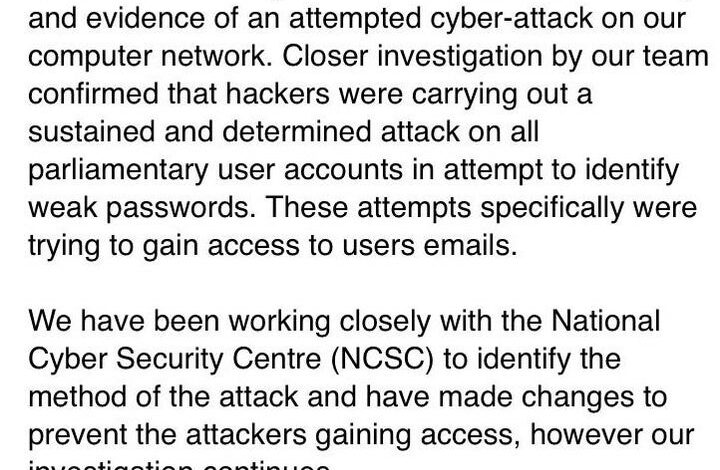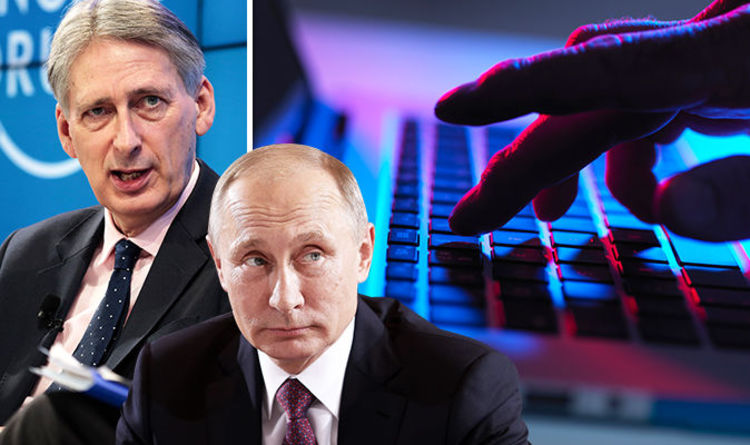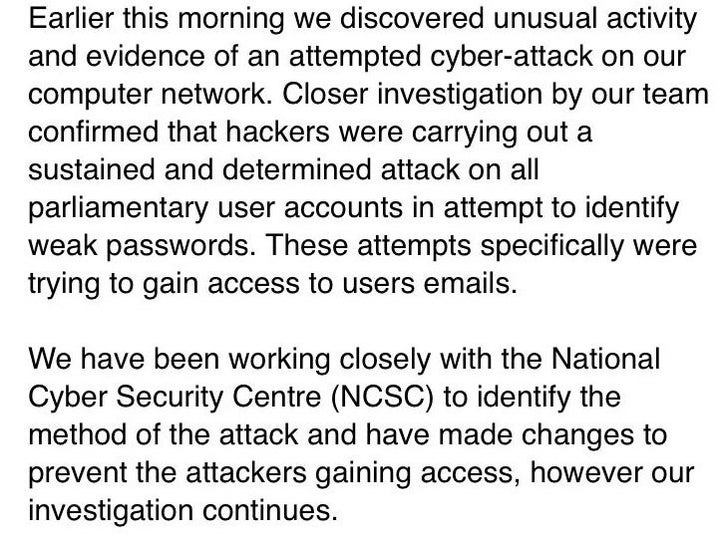
Category One Cyber Attack to Hit the UK
Category One cyber attack to hit the UK – the very phrase sends shivers down your spine, doesn’t it? Imagine a digital Pearl Harbor, crippling essential services and plunging the nation into chaos. This isn’t science fiction; it’s a chillingly realistic possibility. We’ll delve into the potential scale, the likely perpetrators, and the terrifying vulnerabilities that could be exploited.
Get ready for a deep dive into the dark underbelly of the digital world.
This post explores the potential for a devastating Category One cyber attack against the UK, examining everything from the types of attacks that could be launched to the potential long-term consequences. We’ll look at who might be behind such an attack, their motivations, and the weaknesses in our systems that they could exploit. Crucially, we’ll also discuss how we can better prepare ourselves and mitigate the risks.
Defining the “Category One” Cyber Attack

A Category One cyber attack in the UK context represents the most severe type of cyber incident, posing a significant threat to national security and critical infrastructure. These attacks are characterized by their scale, sophistication, and potential for widespread disruption, impacting essential services and potentially causing significant economic and social damage. They often involve advanced persistent threats (APTs) with state-sponsored actors as perpetrators, leveraging highly sophisticated techniques to bypass existing security measures.The impact of a Category One attack goes far beyond simple data breaches.
We’re talking about crippling essential services, potentially resulting in widespread power outages, disruption to financial systems, communication failures, and even loss of life. The scale and scope are immense, potentially affecting millions of individuals and businesses across the nation.
Attack Vectors for Category One Cyber Attacks
A Category One attack can leverage numerous attack vectors, often combining multiple methods for maximum impact. These attacks are rarely simple; instead, they are meticulously planned and executed, often involving a long period of reconnaissance and infiltration before the main event. The attackers might exploit vulnerabilities in software, hardware, or human processes.For example, a sophisticated phishing campaign targeting employees of a critical national infrastructure provider could be the initial vector, leading to malware deployment and subsequent data exfiltration or system compromise.
Alternatively, a zero-day exploit, targeting a previously unknown vulnerability in a widely used piece of software, could allow for widespread infection. Supply chain attacks, compromising a seemingly minor component used across many systems, represent another significant threat vector, offering a path to widespread and stealthy infiltration. Finally, direct physical access, potentially gained through insider threats or espionage, could be used to install malicious hardware or bypass network security.
Potential Impact on Critical National Infrastructure
The potential impact on critical national infrastructure (CNI) is catastrophic. Consider a scenario where a Category One attack targets the UK’s power grid. A successful attack could lead to widespread and prolonged power outages, affecting hospitals, transportation networks, communication systems, and essential services. The economic cost would be immense, with businesses forced to shut down and supply chains disrupted.
Furthermore, the societal impact could be equally devastating, potentially leading to civil unrest and a humanitarian crisis. Similar scenarios could be played out with attacks targeting financial institutions, water treatment plants, or communication networks. The interconnected nature of CNI means that an attack on one sector can easily cascade, causing ripple effects throughout the entire system.
Scale and Scope of a Category One Attack
The scale and scope of a Category One cyber attack would be unprecedented in the UK. We are talking about a level of disruption that would dwarf any previous cyber incident. The number of affected individuals and businesses could be in the millions, potentially impacting every aspect of daily life. The economic cost could run into billions, if not trillions, of pounds.
The recovery process would be long and complex, requiring significant investment in resources and expertise. The 2017 NotPetya ransomware attack, although not strictly a Category One attack in the UK context, serves as a grim example of the potential for widespread disruption and economic damage caused by a large-scale cyber incident. A Category One attack would be considerably more sophisticated and targeted, resulting in a far greater impact.
Potential Actors and Motives

A Category One cyber attack against the UK would represent a significant escalation in cyber warfare, demanding a careful consideration of the potential perpetrators and their driving forces. Understanding these actors and their motivations is crucial for developing effective defensive strategies and deterrents. The scale and sophistication required for such an attack significantly narrows the field of likely suspects.The motivations behind such an attack are multifaceted and can range from geopolitical ambitions to economic gain or simple acts of malice.
The potential consequences, however, would be far-reaching, affecting critical national infrastructure and potentially causing widespread societal disruption. Therefore, identifying potential actors and their capabilities is paramount for national security.
State-Sponsored Actors
Several nation-states possess the cyber capabilities to execute a Category One attack. These actors typically operate under the guise of government agencies or military units, benefiting from significant resources, advanced technologies, and highly trained personnel. For instance, Russia has a long history of sophisticated cyber operations, demonstrated through attacks targeting critical infrastructure in other countries. Similarly, China’s People’s Liberation Army (PLA) has been implicated in various cyber espionage campaigns and attacks against both governmental and private entities.
Other potential actors include North Korea, known for its disruptive cyber activities, and Iran, which has demonstrated an ability to conduct targeted cyber attacks against its adversaries. These states might be motivated by political objectives, such as undermining the UK’s influence on the global stage, or economic aims, like stealing intellectual property or disrupting financial markets.
Motivations for a Category One Attack
The motivations for a Category One attack against the UK are complex and can be broadly categorized into political, economic, and ideological drivers. Political motivations could include disrupting UK elections, damaging its international standing, or retaliating for perceived injustices. Economic motivations might involve stealing sensitive data, disrupting financial systems for economic advantage, or crippling key industries to gain a competitive edge.
Ideological motivations, while less common for attacks of this scale, could involve disrupting critical services to express a particular political or social agenda. A real-world example reflecting these varied motivations is the NotPetya ransomware attack, which, while initially appearing as a ransomware campaign, caused significant damage to global businesses, potentially hinting at a state-sponsored element with underlying geopolitical motivations.
Capabilities of Threat Actors
The capabilities of potential threat actors vary significantly. State-sponsored actors generally possess superior resources, including advanced persistent threats (APTs), specialized malware, and highly skilled personnel. These groups can sustain long-term campaigns, often remaining undetected for extended periods. Non-state actors, such as sophisticated criminal groups or hacktivists, while potentially capable of inflicting considerable damage, generally lack the resources and sustained operational capabilities of state-sponsored actors.
The scale and sophistication of a Category One attack suggest a level of expertise and resource commitment only realistically attainable by state-sponsored groups with dedicated cyber warfare units. For example, the level of coordination and technical prowess needed to simultaneously compromise multiple critical systems across different sectors would require a significant investment in personnel and infrastructure.
Resources and Expertise Required, Category one cyber attack to hit the uk
Executing a Category One attack necessitates substantial resources and expertise across multiple domains. This includes highly skilled penetration testers, malware developers, network engineers, and intelligence analysts. Significant financial resources are also required to acquire and maintain the necessary infrastructure, tools, and personnel. The ability to exploit zero-day vulnerabilities, evade detection mechanisms, and maintain operational security over an extended period further underscores the level of technical expertise required.
The development and deployment of custom malware, capable of targeting specific systems and bypassing security defenses, necessitates considerable programming skill and a deep understanding of target systems. The attack would also necessitate extensive planning and intelligence gathering to identify vulnerabilities and critical systems within the UK’s infrastructure. A successful attack would likely involve a multi-stage approach, requiring sophisticated coordination and communication between different teams.
Vulnerabilities and Weaknesses Exploited
A Category One cyber attack against the UK would likely exploit known vulnerabilities within critical national infrastructure (CNI). These vulnerabilities aren’t necessarily new or unknown; rather, they represent weaknesses in systems that, when combined or exploited cleverly, could cause catastrophic damage. The attackers would likely focus on achieving maximum impact, potentially cascading failures across multiple interconnected systems.
Understanding the specific vulnerabilities and the technical methods used to exploit them is crucial for effective mitigation and preparedness. The following table highlights some key vulnerabilities and potential attack scenarios.
Critical Infrastructure Vulnerabilities
| Vulnerability | Severity | Mitigation | Impact |
|---|---|---|---|
| Outdated or Unpatched Software/Firmware | Critical | Regular patching and updates, robust vulnerability management program, strong change management processes. | System compromise, data breaches, service disruption, potentially cascading failures across dependent systems. Example: A legacy industrial control system (ICS) running outdated software could be exploited through known vulnerabilities, leading to physical damage in a power plant. |
| Weak or Default Credentials | High | Strong password policies, multi-factor authentication (MFA), regular credential rotation, privileged access management (PAM). | Unauthorized access, data theft, lateral movement within the network, system control. Example: An attacker gaining access to a default-password-protected router in a hospital could disrupt medical equipment operation or steal sensitive patient data. |
| Lack of Network Segmentation | High | Network segmentation, micro-segmentation, firewalls, intrusion detection/prevention systems (IDS/IPS). | Lateral movement, rapid spread of malware, increased attack surface. Example: A compromised server in a poorly segmented network could allow an attacker to easily access other sensitive systems, including databases holding personal information. |
| Insufficient Cybersecurity Awareness Training | Medium (but with high potential impact) | Regular security awareness training for all staff, phishing simulations, robust security policies and procedures. | Phishing attacks, social engineering, insider threats. Example: An employee clicking on a malicious link in a phishing email could compromise the entire network, especially if combined with other vulnerabilities. |
Technical Exploitation Methods
Exploiting these vulnerabilities would involve a combination of techniques. For outdated software, attackers might leverage known exploits published in databases like the National Vulnerability Database (NVD). Weak credentials could be targeted through brute-force attacks, dictionary attacks, or credential stuffing. Lack of network segmentation allows for lateral movement using techniques like network scanning and exploiting vulnerabilities in exposed services.
Social engineering, including spear-phishing attacks, would be used to bypass security controls and gain initial access.
Hypothetical Attack Scenarios
Scenario 1: An attacker gains access to a poorly secured industrial control system (ICS) in a water treatment plant through a known vulnerability in outdated firmware. This allows them to manipulate the system, potentially contaminating the water supply. This is worsened by a lack of network segmentation, allowing them to spread the compromise.
Scenario 2: A spear-phishing campaign targets employees at a major bank, leading to a credential compromise. Weak passwords and a lack of MFA allow the attacker to gain access. The attacker then uses lateral movement techniques to access sensitive customer data and financial systems, potentially leading to significant financial losses and reputational damage. This scenario is amplified by insufficient network segmentation.
Response and Mitigation Strategies

A Category One cyber attack on the UK would trigger an immediate and multifaceted response, involving a complex interplay between government agencies, private sector organisations, and international partners. The scale and severity of such an attack would necessitate a coordinated, robust, and adaptable strategy focusing on containment, recovery, and long-term resilience.The response would be far-reaching, demanding a rapid and effective deployment of resources and expertise.
This isn’t a hypothetical scenario; past incidents, such as the NotPetya ransomware attack in 2017, highlight the devastating impact of widespread cyberattacks and the crucial need for swift and coordinated responses. The lessons learned from these events would heavily inform the UK’s response to a Category One attack.
UK Government and Cybersecurity Organisation Response
The National Cyber Security Centre (NCSC), part of GCHQ, would be at the forefront of the response, coordinating efforts with other government departments like the Cabinet Office and the National Infrastructure Commission. Their response would include immediate incident analysis, threat assessment, and the activation of established emergency response protocols. They would likely issue public warnings, coordinate vulnerability patching efforts across critical infrastructure, and provide technical assistance to affected organisations.
Furthermore, law enforcement agencies like the National Crime Agency (NCA) would investigate the attack’s origins and pursue potential perpetrators. This coordinated response would leverage existing national cybersecurity frameworks like the Cyber Security Information Sharing Partnership (CISP) to facilitate information sharing and collaborative mitigation efforts.
Relevant Cybersecurity Frameworks and Protocols
The UK’s response would heavily rely on existing cybersecurity frameworks and protocols. The National Cyber Security Centre (NCSC) provides guidance through its Cyber Assessment Framework and its various publications on incident response. These frameworks Artikel best practices for risk management, vulnerability management, incident response, and business continuity. ISO 27001, a widely adopted international standard for information security management systems, would also play a significant role in guiding affected organisations’ recovery efforts.
Furthermore, the NIST Cybersecurity Framework, although a US standard, provides a valuable, internationally recognised model for risk management and response that could inform the UK’s actions. These frameworks emphasize proactive measures, preventative strategies, and well-defined incident response plans as crucial components of national and organisational cybersecurity postures.
Incident Response Procedure
A Category One cyber attack would necessitate a structured incident response procedure, typically following a lifecycle model (e.g., NIST’s incident response lifecycle). This would involve:
- Preparation: This pre-incident phase involves developing and regularly testing incident response plans, establishing clear communication channels, and defining roles and responsibilities. This phase includes establishing clear lines of communication and setting up secure channels for information exchange.
- Identification: Detecting the attack, understanding its nature and scope, and assessing its potential impact.
- Containment: Isolating affected systems to prevent further damage and data exfiltration. This might involve shutting down affected networks or systems to prevent further spread.
- Eradication: Removing the malware or threat actor from affected systems. This often requires deep forensic analysis and the deployment of specialized tools.
- Recovery: Restoring affected systems and data from backups. This may involve a phased approach, prioritizing critical systems and data.
- Lessons Learned: A post-incident review to identify weaknesses in existing security measures, improve response capabilities, and prevent future attacks.
Effective Communication and Collaboration
Effective communication and collaboration are paramount throughout the response. The NCSC would play a central role in disseminating information to affected organisations, the public, and international partners. This would involve using multiple channels, including secure communication platforms, press releases, and public awareness campaigns. Open and transparent communication would be crucial to build public trust and ensure coordinated efforts across all stakeholders.
The recent Category One cyber attack hitting the UK really highlights the urgent need for robust security measures. Understanding how to effectively manage cloud security is paramount, and that’s where solutions like those discussed in this article on bitglass and the rise of cloud security posture management become incredibly important. Strengthening our cloud security posture is no longer optional; it’s crucial in preventing future large-scale attacks like this one.
Collaboration would extend beyond national borders, involving international cooperation to identify and track down perpetrators, share threat intelligence, and coordinate recovery efforts. The sharing of threat intelligence and lessons learned is critical to build collective resilience against future attacks. Regular briefings and secure communication channels are essential for coordinating efforts between government agencies, private sector organizations, and international partners.
Long-Term Implications and Prevention: Category One Cyber Attack To Hit The Uk
A Category One cyberattack against the UK would have far-reaching and potentially devastating consequences, extending beyond the immediate disruption of services. The long-term economic and social impact could cripple national infrastructure, erode public trust, and significantly hinder the UK’s global standing. Understanding these implications is crucial for developing robust preventative measures.The economic fallout could be catastrophic. Disruption to critical national infrastructure, such as power grids, transportation networks, and financial institutions, would lead to widespread economic losses, potentially exceeding billions of pounds.
The recent Category One cyber attack on the UK highlights the urgent need for robust, secure systems. Building these systems efficiently requires innovative approaches, and that’s where exploring the potential of domino app dev, the low-code and pro-code future , comes in. This could significantly speed up development while maintaining security, which is crucial in the face of increasingly sophisticated attacks like the one the UK just faced.
Businesses would suffer from data breaches, operational downtime, and reputational damage. The cost of recovery and remediation would be immense, placing a significant strain on public finances and potentially impacting the UK’s credit rating. Socially, a major cyberattack could lead to widespread panic, civil unrest, and a loss of confidence in government and institutions. The disruption of essential services like healthcare and emergency response could have severe consequences, potentially leading to loss of life.
Furthermore, the attack could fuel societal divisions and exacerbate existing inequalities. The erosion of public trust in digital systems and institutions could have lasting ramifications, impacting future economic activity and social cohesion.
Economic and Social Consequences of a Category One Cyberattack
The economic consequences of a successful Category One cyberattack on the UK would be severe and multifaceted. The immediate impact would include widespread business disruption, leading to lost productivity and revenue. The longer-term consequences could include a decline in foreign investment, increased insurance premiums for businesses, and a loss of consumer confidence. This could trigger a recessionary spiral, impacting employment and overall economic growth.
Beyond the purely economic ramifications, a large-scale cyberattack could also severely damage the UK’s international reputation and standing, affecting its ability to attract investment and engage in international trade. For example, a crippling attack on the national banking system could trigger a financial crisis, similar in scale to the 2008 global financial crisis, but with the added element of digital insecurity fueling public anxieties.
The social consequences would be equally significant. Public trust in government and institutions could plummet, leading to social unrest and political instability. The disruption of essential services, such as healthcare and emergency response, could have a devastating impact on the population. The potential for the spread of misinformation and disinformation during a crisis could also exacerbate social divisions and fuel existing tensions.
Preventative Measures to Reduce Cyber Vulnerability
A multi-pronged approach is necessary to reduce the UK’s vulnerability to Category One cyberattacks. This requires a commitment to proactive cybersecurity measures across all sectors of society.
- Strengthening Critical National Infrastructure: Implementing robust cybersecurity protocols and investing in advanced threat detection systems for essential services like power grids, transportation, and financial institutions is paramount. This includes regular security audits, penetration testing, and employee training.
- Improving Cybersecurity Skills and Awareness: Investing in cybersecurity education and training programs for both the public and private sectors is crucial. This includes developing a national cybersecurity curriculum for schools and universities, and providing ongoing professional development opportunities for IT professionals.
- Enhancing International Cooperation: Collaboration with international partners to share threat intelligence and develop coordinated responses to cyberattacks is essential. This includes participating in international cybersecurity forums and working with allied nations to establish joint cybersecurity initiatives.
- Developing a National Cybersecurity Strategy: A comprehensive national cybersecurity strategy is needed, outlining clear goals, responsibilities, and accountability measures. This strategy should encompass all sectors of society and be regularly reviewed and updated to reflect evolving threats.
- Promoting Data Security and Privacy: Implementing strong data protection regulations and promoting best practices for data security across all sectors is crucial. This includes mandating data encryption, implementing robust access control measures, and educating individuals about the importance of online security.
Proactive Cybersecurity Measures and Investments
Proactive cybersecurity measures are not merely a cost; they are a critical investment in national security and economic stability. The cost of inaction far outweighs the cost of prevention. Investing in advanced threat detection systems, robust cybersecurity training programs, and international collaboration is essential to mitigating the risk of a Category One cyberattack. A proactive approach should involve continuous monitoring of systems, regular security audits, and prompt responses to vulnerabilities.
This also requires a cultural shift within organizations, where cybersecurity is viewed not as an afterthought but as an integral part of operations. The UK government, in collaboration with the private sector, needs to invest heavily in research and development to stay ahead of evolving cyber threats. This includes supporting the development of new technologies, such as artificial intelligence and machine learning, to enhance threat detection and response capabilities.
Failure to make these investments would leave the UK vulnerable to future attacks and could have devastating consequences for the nation’s economy and security.
Hypothetical National Cybersecurity Awareness Campaign
A national cybersecurity awareness campaign, codenamed “Shield,” could utilize a multi-platform approach to educate the public and organizations about the importance of cybersecurity. The campaign would leverage television and radio advertisements, social media campaigns, and public awareness events. The core message would be simple, memorable, and easily understood by all demographics: “Stay Secure, Stay Protected.” The campaign would use relatable scenarios to demonstrate the potential consequences of poor cybersecurity practices, emphasizing the importance of strong passwords, secure websites, and regular software updates.
It would also provide clear and actionable advice on how individuals and organizations can protect themselves from cyber threats. For example, a series of short, animated videos could illustrate the dangers of phishing scams and ransomware attacks, while interactive online tools could help individuals assess their personal cybersecurity risks. Furthermore, the campaign could include partnerships with schools, universities, and community organizations to reach a wider audience.
The goal would be to cultivate a culture of cybersecurity awareness and responsibility across the UK, fostering a collective approach to mitigating cyber risks.
Case Studies and Analogies
Understanding the potential impact of a Category One cyber attack on the UK requires examining similar events elsewhere. By analyzing past large-scale attacks, we can glean valuable insights into potential vulnerabilities, attack vectors, and the cascading effects such an event could have on critical national infrastructure. This analysis will also highlight the unique challenges posed by the UK’s specific infrastructure and geopolitical context.
Several major cyberattacks across the globe offer valuable parallels. These incidents, while varying in their specifics, demonstrate the potential for widespread disruption and long-term consequences stemming from sophisticated cyber operations. Comparing these events to a hypothetical Category One attack on the UK allows us to better understand the potential scale and severity of such an event.
Notable Cyberattacks and Their Relevance to the UK
Analyzing past cyberattacks reveals commonalities in attack vectors, targets, and consequences. These case studies underscore the potential for significant disruption to essential services, economic instability, and societal upheaval. The UK, with its highly interconnected infrastructure and significant digital footprint, is not immune to these threats.
| Case Study | Target | Attack Vector | Impact |
|---|---|---|---|
| NotPetya (2017) | Global businesses, particularly in Ukraine and impacting companies worldwide | Supply chain attack via Ukrainian accounting software | Widespread disruption, billions of dollars in losses, significant operational downtime across multiple sectors. |
| Colonial Pipeline Ransomware Attack (2021) | Major US fuel pipeline | Ransomware | Fuel shortages across the East Coast of the US, highlighting the vulnerability of critical infrastructure to cyberattacks. |
| SolarWinds Supply Chain Attack (2020) | US government agencies and private sector organizations | Compromised software updates | Extensive data breaches, potential for long-term espionage and sabotage. |
| WannaCry Ransomware (2017) | Global organizations, including the NHS in the UK | Exploitation of a known vulnerability in Windows operating systems | Significant disruption to healthcare services in the UK, highlighting the vulnerability of national healthcare systems. |
The WannaCry attack, specifically, provides a particularly relevant case study for the UK, as it directly impacted the National Health Service (NHS). The attack demonstrated the vulnerability of even seemingly well-protected systems to widespread ransomware attacks and highlighted the potential for significant disruption to essential public services. The scale and impact of a Category One attack could be considerably greater, given its hypothetical scope and sophistication.
UK’s Unique Infrastructure and Geopolitical Position
The UK’s unique infrastructure and geopolitical position significantly influence the potential impact of a Category One cyber attack. Its highly interconnected digital infrastructure, coupled with its role as a global financial center and a key player in international affairs, makes it a particularly attractive target. A successful attack could have far-reaching consequences, not only for the UK itself but also for global stability.
The UK’s reliance on interconnected systems across various sectors – finance, energy, transport, and healthcare – means that a successful attack could trigger cascading failures with far-reaching consequences. The country’s prominent role in international relations also makes it a potential target for state-sponsored attacks aiming to disrupt global markets or destabilize the political landscape.
Last Point
The threat of a Category One cyber attack against the UK is real and demands our immediate attention. While the prospect is daunting, understanding the potential vulnerabilities and developing robust mitigation strategies is crucial. This isn’t about creating panic, but about fostering a proactive approach to cybersecurity. By acknowledging the risks and investing in preventative measures, we can significantly reduce our vulnerability and protect our nation’s critical infrastructure.
Let’s hope this knowledge helps us avoid a digital catastrophe.
FAQ Section
What specific types of critical infrastructure are most vulnerable?
Power grids, financial institutions, healthcare systems, and communication networks are all high-value targets due to their interconnectedness and widespread impact.
What role does human error play in cyberattacks?
Human error, such as phishing scams or weak passwords, often creates the initial point of entry for attackers. Strong security awareness training is essential.
What is the UK government doing to prevent such attacks?
The UK government is investing heavily in cybersecurity infrastructure and initiatives, working with private sector organizations to improve national resilience. However, the threat landscape is constantly evolving.
What can individuals do to help protect against these attacks?
Individuals should practice good cyber hygiene: use strong passwords, be wary of phishing emails, and keep software updated. Reporting suspicious activity is also vital.





